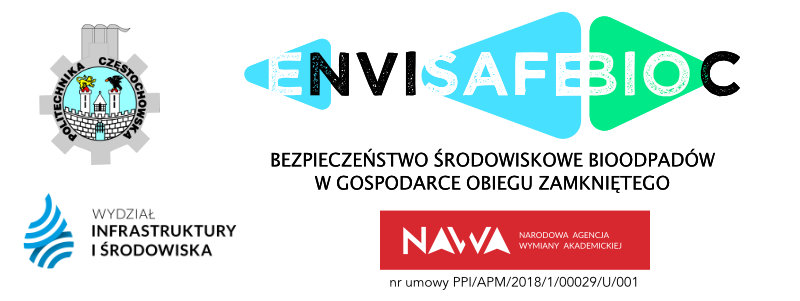About the Project

The EnviSafeBioC PROJECT is funded by the NAWA National Agency for Academic Exchange
Financing amount PLN 1 998 263,75
The main scientific goal of the project is:
The main scientific goal is to undertake international institutional cooperation in the field of defining sustainable strategies for the management of sewage sludge / bio-waste, their treatment and disposal, taking into account the current state of knowledge and legislation, characteristics and ecotoxicology.
Decision-making tools such as end-of-waste (EWC) criteria and Life Cycle Assessment (LCA) will allow a comprehensive approach to waste management systems, and enable the environmental, technical and economic aspects to be taken into account. This will allow defining the best technologies for waste and examining their ecotoxicity in the long term. The majority of EU members implementing legislative solutions apply them at the national level, but there is no integrated management system. The activities proposed under the project will contribute to establishing criteria for selecting the best solutions in accordance with the requirements of the circular economy, in the context of activities "from waste to resources". The economy of closed cycle assumes continuous improvement of the cycle of matter and energy cycles, focus on saving natural resources, use raw materials and recycling.
The project goal will be achieved through an interdisciplinary look at the life cycle of organic waste (person / bio waste) to transform it into capital.
Scientific goals:
- assessment of the impact of various methods of sewage sludge / biowaste management on the environment using decision tools, eg LCA; defining the best available technologies (BAT) effective recovery of raw materials adapted to local needs;
- ecotoxicological evaluation (the fate of selected pollutants in the short and long term); comparison of scenarios for the management of bio-waste in the technological, economic and sociological aspect; encourage policymakers to update legislation.
Objectives related to capacity building:
- exchange of knowledge between experts / scientists from various fields of knowledge in the field of biowaste processing technology, estimation of environmental risk associated with the application of wastes / bio-waste, assessment of the impact of selected pollutants, assessment of the interactions of microorganisms and sewage sludge / bio-waste in terrestrial ecosystems, economic and sociological aspect proposed solutions for processing of waste / bio-waste.
- preparation of a joint research program in order to obtain maximum added value from cooperation - strengthening cooperation
- international exchange which will allow you to compare the strategy in real time.
- creation of new groups of cooperation between countries / disciplines, as well as encouragement to engage in civic initiatives, prospective studies, by conducting seminars, organizing international conferences, scientific internships, increasing the mobility of researchers and study trip raising the didactic potential at the university of the Applicant by improving the competences of employees and visiting scientists from other universities.
The project is primarily intended for the team implementing it, because of this there is no specific target group of beneficiaries. However, a number of activities planned in the project indicate that a significant group of beneficiaries could benefit indirectly.
These include primarily:
- participants of conferences and seminars organized in the Partnership
- participants of classes conducted during study / technical visits / internships Topics related to the project - environmental safety of bio-waste in the economy is current. Bio-waste is a huge potential for energy and matter recovery. However, their introduction into the environment is associated with a significant risk of water pollution (especially underground drinking water reservoir) and soils with substances that are often not monitored in any way. The so-called problem emerging contaminants is becoming the subject of research of many scientists around the world. Therefore, meetings carried out during the project may in effect turn into research projects, joint research works and international publications in journals of significant IF value. A project on this subject is already planned as part of Horizon 2020.
A number of trips are planned for the team members in the project. These are:
- study trips to all Partners in the project from 7 to 21 days
- internship for doctoral student / doctor - 3 months at the University of Lille (France) and NMBU in Aas (Norway)
- technical visit to leading centers in Japan dealing with highly effective technologies for recovery from bio-waste. Japan is one of the leaders in introducing the principles of the circular economy.
- trip to the cyclical conference SDEWES (The International Conference for Sustainable Development of Energy, Water and Environment Systems) Dubrovnik 2019.
Deklaracja dostępności




